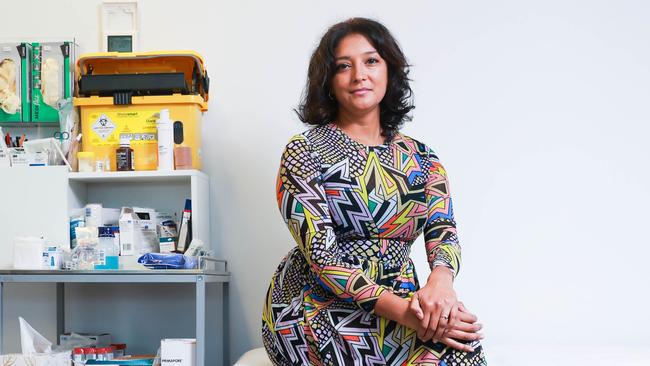Q&A: Neela Janakiramanan, hand surgeon, 41
Surgeon Neela Janakiramanan reveals the challenges faced by women medicos, our broken hospital system — and the dangers of avocados.

You’re a reconstructive plastic surgeon, mother of three, teacher, mentor, media commentator, writer and novelist. Do you actually sleep? I do sleep and I desperately need my sleep. I’m very grumpy at less than seven hours. And eight to nine is ideal. I don’t know. I just kind of jam it all in...
What attracted you to hands? It’s very hard to explain, but this was an area where I found mentors; a group of surgeons whose values and personalities I felt I could work with in the longer term. And I like the delicacy of the surgery.
What have you got against avocados? I love avocados, but I see a lot of avocado-related injuries. You just shouldn’t try to get the pip out with a knife!
Your novel The Registrar is a gripping account of a woman training as a surgeon in a system rife with understaffing, burnout, bullying, prejudice... is this your experience? I wrote it specifically to be very true to life. Issues like sexual harassment are “bright line” topics for women but there’s also being spoken over in meetings, being denied access to a case because it was determined in the men’s change room, missing out on jobs or being offered fewer hours on the assumption you’re going to go off and have babies… It’s this insidious kind of pushing women out of training opportunities, leadership opportunities, which is certainly not unique to medicine.
People talk about how our hospital system is broken. Are they exaggerating? Not at all. The whole health system has been struggling for a long time, but now the pressures are heightened and more sustained: long waiting lists, challenges in discharging patients because there aren’t nursing home beds or care facilities or rehab facilities for them to go to... you get this backlog through the entire system, combined with significant staff burnout, which is now manifesting as people leaving healthcare. Huge numbers of nurses have reduced their hours or quit since the pandemic started.
If there was one thing you could change about the system, what would it be? I would like to see every healthcare worker valued as an important member of a bigger system. And I’m not talking tickertape parades, or handing out potato cakes to say thank you, as a hospital in Melbourne did recently. From the federal health minister all the way down to every manager in every ward and in every GP clinic, instead of seeing workers as foot soldiers, as cannon fodder, if you spoke to them about what the problems are, it’s they who are going to have the solutions. And so we’ve got to treat people better.
You were born in India, where your grandfather was a GP-surgeon. Was it always going to be medicine for you? My parents, who were not doctors, strongly discouraged me from pursuing medicine. Mum cited her sister’s experiences as an obstetrician in London as reasons I should be cautious of this as a profession. But I also wanted to do journalism.
What do you say to those who think outspoken medicos should “stay in your lane” over issues like gun control, treatment of refugees, and care of the elderly? I would say medicine is more than science, more than blood pressure pills and releasing a carpal tunnel. It is fundamentally about understanding how people live, how people love, how people die. I am passionate about social issues because in the consulting room, I can see how they affect my patients on a day-to-day basis. And based on what I see, I feel the need to advocate for those who are not able to do so themselves.
Why is it important to reduce elective surgery wait times? As bottlenecks tighten, the most urgent cases get done and simple conditions such as carpal tunnel syndrome, something I treat all the time, fall off the bottom of the list. It’s a degenerative and painful condition, but you might wait two, three years to be seen in a public outpatients clinic. And then you may wait another year for surgery. The benchmark is you should be seen within six to 12 months... I have seen patients lose their jobs, struggled to pay their mortgage, have their relationships fall apart, all because they can’t get the surgery they need.
The Registrar by Neela Janakiramanan (Allen & Unwin, $32.99) is out on July 5.



To join the conversation, please log in. Don't have an account? Register
Join the conversation, you are commenting as Logout